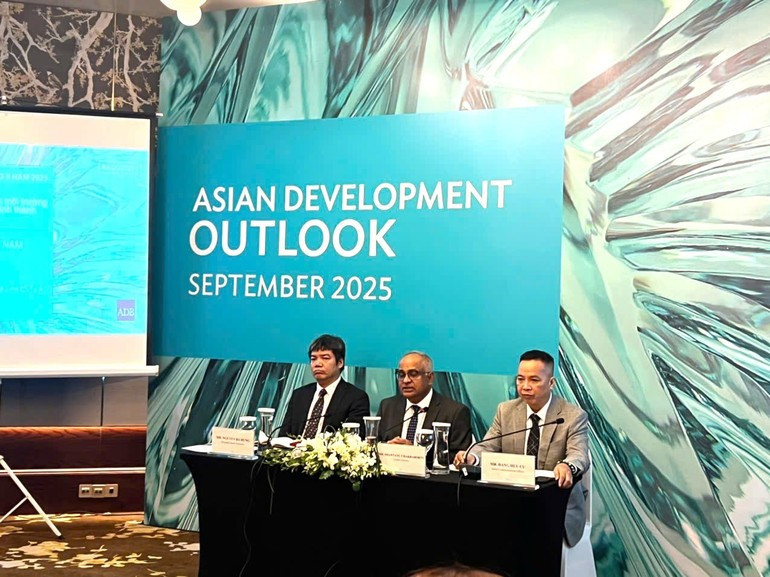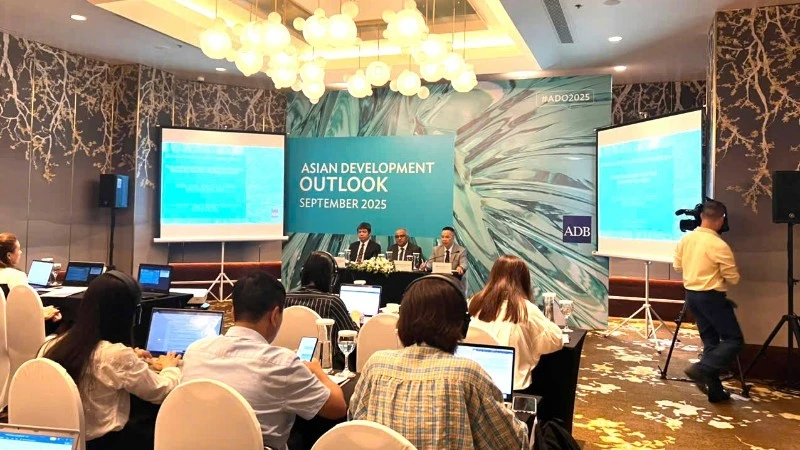Viet Nam’s economy on the path of recovery and development
Reviewing Viet Nam’s economic performance in the early months of 2025, ADB stated that growth was impressive compared to the same period last year, reaching 7.5% versus 6.4% in the first half of 2024, the highest first-half figure since 2010.
Industry and construction grew strongly, recording 8.3% in the first half of 2025 compared with 7.5% in the same period of 2024. Increased orders for exports ahead of the United States’ countervailing tariffs drove manufacturing growth of 10.1%.
Although public investment has yet to meet the full-year plan, actual disbursement has contributed to construction growth of 9.6%, compared with 7.3% in the first half of 2024. Fiscal expansion and the recovery of tourism and related sectors spurred services to grow by 8.1%. Agriculture expanded by 3.8%, showing resilience despite external uncertainties, supported by price stability.

Shantanu Chakraborty, ADB Country Director for Viet Nam, expressed his appreciation: despite major global challenges, Viet Nam’s economy achieved outstanding results in the first half of 2025.
Economy remains resilient in 2025–2026
At the press conference, Nguyen Ba Hung, ADB Viet Nam Chief Economist, analysed the opportunities and risks for the economy in the coming period. He noted that the economy will remain resilient in 2025–2026, thanks to expansionary fiscal and monetary policies. Countervailing tariffs imposed by the United States from August 7, 2025 — 20% on imports and 40% on trans-shipments — may affect short-term growth, but stimulus measures are expected to mitigate the impact.

Most key sectors such as industry, manufacturing, services, and consumption are forecast to achieve favourable growth.
Agriculture is expected to post a relatively high growth rate of 3.4% in 2025. According to Nguyen Ba Hung, global demand for high-quality, sustainable food, together with wider adoption of smart farming technologies, will drive the sector. However, agriculture still faces climate risks, fragmented landholdings, limited technology access for smallholder farmers, and global commodity price volatility.
Nguyen Ba Hung stressed that efficient public investment is critical to sustaining growth and easing infrastructure bottlenecks. With public debt at under 34% of GDP—far below the statutory ceiling of 60%—Viet Nam retains considerable fiscal space for growth-supporting measures. Deep institutional reform will help streamline the legal environment, improve disbursement efficiency, and stimulate domestic demand. However, ADB also cautioned that limited capacity in planning, implementation, and project management at all levels will continue to hinder timely disbursement.

On inflation, ADB forecasts 3.9% in 2025, easing slightly to 3.8% in 2026. Falling global energy prices have helped reduce transport costs, a major component of the consumer basket. However, continuous government adjustments to healthcare, education, and electricity prices continue to exert inflationary pressure. Accelerated public investment disbursement and high credit growth may push up prices of materials and services. Currency depreciation could further add to inflation through higher import costs.
Regarding Viet Nam’s growth targets of 8.3–8.5% in 2025 and double-digit growth in subsequent years, Shantanu Chakraborty, ADB Country Director for Viet Nam, noted that these goals are being pursued against a backdrop of rising countervailing tariffs and escalating global and regional geopolitical tensions. To sustain momentum, newly emerging risks and structural constraints will need to be addressed effectively.
















